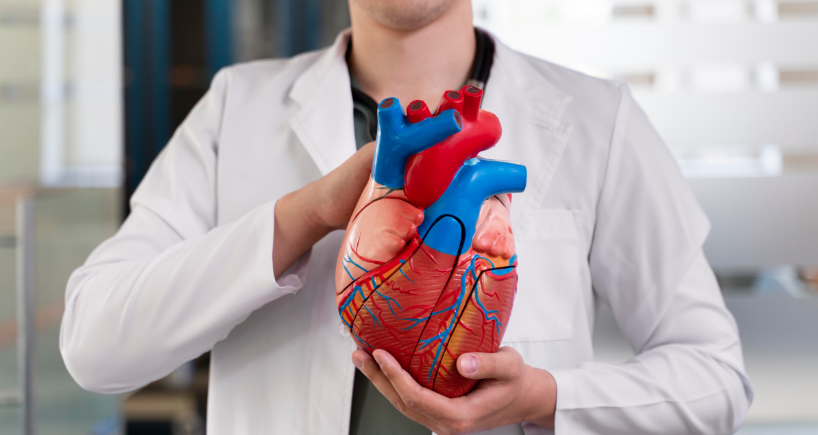
Arrhythmogenic Right Ventricular Cardiomyopathy (ARVC): Symptoms and Managing Risks(ARVC): Symptoms and Managing Risks
Arrhythmogenic right ventricular cardiomyopathy (ARVC) is an inherited heart condition caused by the accumulation of fibrofatty tissue in the right ventricular myocardium, which causes disruptions in heart electrical signals, triggering arrhythmias, which is the clinical significance of the condition. The condition is caused by genes (family history) or changes in the person’s DNA. Although the condition predominantly affects right ventricular function, the study indicates that ARVC can affect both the heart’s right and left chambers, making the condition complex and requiring specialised diagnosis and treatment plans.
Prevalence
The estimated prevalence of ARVC in the general population ranges from 1 in 2000 to 1 in 5000 people; men are affected more commonly than women, with a 3:1 ratio. ARVC is identified as the leading cause of sudden cardiac death in young and athletes. It also contributes up to 10% of undiagnosed cardiac disease deaths in patients under 65 years of age.
Symptoms of ARVC
Cardiac symptoms:
The primary symptoms of ARVC often relate to heart function and include:
- Palpitations: Arrhythmias are common; the patient may suffer from tachy-bradycardias.
- Dizziness or light-headedness: It can also happen during exercise or even when the patient is in a steady state.
- Fainting (Syncope): It is possible to have fainting episodes occasionally, even while exercising.
- Chest pain: Chest discomfort is usually experienced in persons who are engaged in highly energetic activities.
Non-cardiac symptoms:
While ARVC primarily affects the heart, some non-cardiac symptoms can also occur which include
- Fatigue
- Shortness of Breath
- Anxiety
Diagnosis and screening of ARVC
The diagnosis of ARVC involves imaging and other test to determine the condition. Some of them include:
- Electrocardiogram
- Holter monitoring
- Cardiac magnetic resonance
- Echocardiography
- Endomyocardial biopsy
- Cardiac catheterisation
In addition to the above diagnostic modalities, genetic testing has shown that more than 50 genes play a role in ARVC-affected families, which can be inherited from either parent. This also highlights the need for regular cardiology screening. Because recessive genes may also play a role in the transmission of the disease, it is important to screen all relatives in the family with a history of the condition, even if no symptoms have appeared.
ARVC treatment
The objective of managing ARVC is to decrease the likelihood of sudden cardiac death, slow the disease’s progression, and improve the quality of life by alleviating the burden of arrhythmias and symptoms associated with heart failure. ARVC management encompasses a variety of strategies, which include:
- Lifestyle management: This involves limitations to physical activity or heavy exercise that exerts pressure on heart muscles. Individuals with ARVC are recommended to limit their exercise to less than 650 MET-hours per year. Metabolic Equivalent of Task (MET) is a way to measure exercise intensity, where 650 MET hours means about 30 minutes of brisk walking each day throughout the year.
- Medication: This involves using antiarrhythmic drugs, such as beta-blockers, to control arrhythmias and standard therapies, such as ACE inhibitors, to manage heart failures. Anticoagulants are indicated for patients with thromboembolic complications.
- Implantable cardioverter-defibrillator (ICD): ICD is said to be optimal therapy for the prevention of sudden cardiac arrest and is preferred in patients who have cardiac arrest, symptomatic ventricular tachycardia or severe ventricular dysfunction. In this method, the surgeon places an ICD, usually under the skin or near the collarbone. Thin wires are connected from the ICD to the heart to monitor its activity.
- Radiofrequency catheter ablation: This procedure is indicated in patients with frequent or resistant ventricular tachycardia and experienced implantable cardioverter-defibrillator (ICD) discharges despite proper antiarrhythmic therapy. This technique is used to treat abnormal heart rhythms by using radiofrequency energy. The procedure involves placing a catheter into a blood vessel. The catheter targets to transmit radiofrequency energy to heat and destroy the problematic heart tissue.
Conclusion
ARVC is a severe heart disease that requires careful management and monitoring. By adhering to prescribed treatment, timely follow-up with doctors, and lifestyle changes, individuals with ARVC can effectively manage their symptoms and minimise the risk of complications such as sudden cardiac arrest. Regular follow-up and open communication with health professionals are essential for ensuring a healthy life despite the prevailing conditions.



















